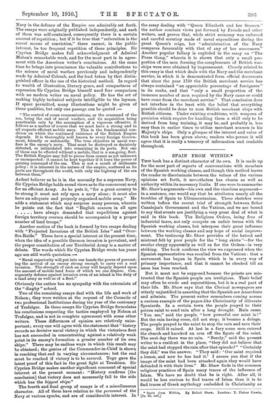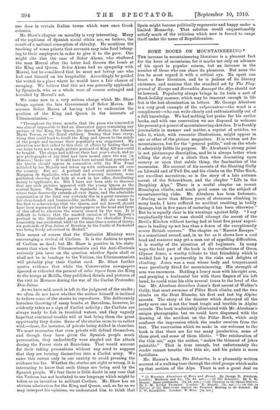SPAIN FROM WITHIN.* This book has a distinct character of
its own. It is made up for the most part of reports of conversations with members of the Spanish working classes, and though this method leaves the reader to discriminate between the values of the various opinions set forth, it nevertheless has charm as well as authority within its necessary limits. If one were to summarise Mr. Shaw's arguments—his own and the vicarious argument— in a sentence, one would say that he attributes nearly all the troubles of Spain to Illtramontanism. These sketches were written before the recent trial of strength between Seiior Canalejas's Government and the Vatican, and we are bound to say that events are justifying a very great deal of what is said in this book. The Religious Orders, being free of industrial taxes, not only compete on unfair terms with the Spanish working classes, but interpose their great influence between the working classes and any hope of social improve- ment. The testimony Mr. Shaw provides of the hatred and mistrust felt by poor people for the " long skirts "—for the secular clergy apparently as well as for the Orders—is very striking. The book confirms the view we expressed when the Spanish representative was recalled from the Vatican : that a movement has begun in Spain which is in every way of primary importance, and that it cannot be checked till an issue has been reached.
But it must not be supposed because the priests are mis- trusted that the Spanish people are irreligious. Their belief may often be crude and superstitions, but it is a real part of their life. Mr. Shaw says that the Clerical newspapers are utterly unjustified in asserting that the Spanish are Anarchists and atheists. The present writer remembers coming across a curious example of the pagan-like Christianity of illiterate Spaniards. In a certain town the people prayed to their patron saint to send rain after a long drought. Rain came. " You see," said the people, " how powerful our saint is !" But the rain having come, did not stop; it became a deluge. The people prayed to the saint to stop the rain and save their crops. Still it rained. At last in a fury some men entered the church and knocked an arm off the figure of the saint. The next day there was no rain. " Surely," said the present writer to a resident in the place, "they did not believe that the saint had stopped the rain after that episode?" " Certainly they did," was the answer. " They said : ' Our saint required a lesson, and now he has had it.' I assure you that if the image of the saint had been attacked again they would have defended it with their lives." Mr. Shaw finds in the common religious practices of Spain many traces of the influence of Islam. We have no doubt that he is right. After all, it would be less carious to find traces of Islam than it is to find traces of Greek mythology embedded in Christianity as
• Spain from Within. By Rafael Shaw, London: T. Fisher Univin. [7s. 6d. net.]
one does in certain Italian towns which were once Greek colonies.
Mr. Shaw's chapter on morality is very interesting. Many of the sophisms of Spanish social ethics are, we believe, the result of a national conception of chivalry. He mentions the teaching of some priests that servants may take food belong- ing to their employers in order to give it to the poor. One might cite also the case of Senor Akens, who sheltered the man Morral after the latter had thrown the bomb at the King and Queen. Seiior Akens had no sympathy with Morral, but he considered that he must not betray one who had cast himself on his hospitality. Accordingly he guided the wretch to a place where he would have a fair chance of escaping. We believe that this act was generally applauded by Spaniards, who as a whole were of course outraged and horrified by Morral's act.
We come now to a very serious charge which Mr. Shaw brings against the late Government of Senor Maura. He accuses Seiler Maura, of having tried to undermine the position of the King and Queen in the interests of Ultramontanism :—
" Throughout the three months that the press was censored it was almost impossible to find an illustrated paper containing any picture of the King, the Queen, the Queen Mother, the Infanta Maria Teresa, or the Royal children. During that time every- thing that could tend to recall the King and Queen to the minds of the people and increase their popularity was suppressed. My attention was first called to this state of affairs by finding that in one large town not a single picture postcard of King Alfonso could be bought. The shops had sold out their last year's stock, and no new photographs of any kind had been issued since the war [in Morocco] broke out. It would have been natural that portraits of the Queen should appear in connection with the War Fund initiated by her Majesty and taken up with enthusiasm all over the country. But no. A portrait and several pictures of the Marquess de Squilache, who acted as honorary secretary, were published, showing that lady at work in her office, distributing money to applicants, &e. But I have not been able to discover that any such pictures appeared with the young Queen as the central figure. The Marquess de Squilache is a philanthropist whose fame deservedly extends all over Spain, and the admirable organisation of the fund was certainly due in a great measure to her clear-headed and business-like methods. But she would be the first to acknowledge that the Queen, and not herself, should have been represented in the picture-papers as the head and front of this effort to alleviate the misery caused by the war. It is difficult to believe that the marked omission of her Majesty's portrait in the illustrated papers during the clericalist Press- censorship was accidental, while at the same time a series of thirty- sia postcards of Don Jaime of Bourbon in the Castle of Frohsdorf was being freely advertised in Madrid."
This means of course that the Clericalist Ministry were encouraging a revival of Carlism. It is the fashion to speak of Carlism as dead ; but Mr. Shaw is positive in his state- ments that when the Ultramontanists and the Anti-Clericals seriously join issue on the question whether Spain shall or shall not be in bondage to the Vatican, the Ultramontanists will probably play their Carlist card. Mr. Shaw further quotes evidence that while the Conservative newspapers ignored or ridiculed the present of solar topees from the King to the troops at Melilla, they published details and pictures of the visit to Morocco during the war of the Carlist Pretender, Don Jaime.
As we have said, much is left to the judgment of the reader ; we often do not know whether the author himself is inclined to believe some of the stories he reproduces. The deliberately harmless throwing of many bombs at Barcelona, however, he evidently takes as a sign of Carlist activity ; the Carlists are always ready to fish in troubled waters, and they vaguely hope that continual trouble will at last bring them the great opportunity they desire. Some of the stories seem to us rather wild,—those, for instance, of priests being drilled in churches.
We must remember that even priests will defend themselves, and though they have given the Spanish people much provocation, they undoubtedly were singled out for attack during the Ferrer riots at Barcelona. That would account for their taking precautions without any need to suppose that they are turning themselves into a Carlist army. We enter this caveat only in our anxiety to avoid pressing the evidence too far. Whether the stories are right or wrong, it is interesting to know that such things are being said by the Spanish people. We fear there is little doubt in any case that the Vatican has not hesitated to use language which might be taken as an incentive to militant Carlism. Mr. Shaw has an obvious admiration for the King and Queen, and, so far as we may interpret his opinions, we understand him to think that Spain might become politically regenerate and happy under a limited Monarchy. That solution would unquestionably satisfy much of the criticism which now is forced to range itself under the name of Republicanism.







































 Previous page
Previous page